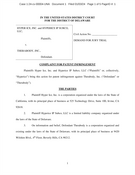-
SEVEN Networks, LLC v. Google LLC DC CAFC
-
2:17-cv-00442 Copied
- E.D. Tex.
- Filed: 05/17/2017
- Docket updated daily
-
-
SEVEN Networks, LLC v. Google LLC DC CAFC
-
2:17-cv-00442 Copied
- E.D. Tex.
- Filed: 05/17/2017
- Docket updated daily
-
